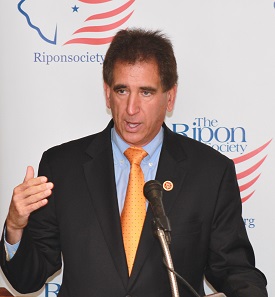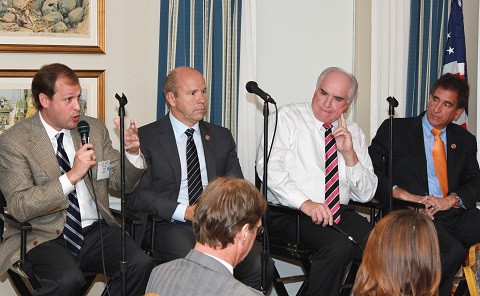Renacci, Kelly, Delaney and Barr Discuss Bipartisan Effort to Find Common Ground on Capitol Hill

WASHINGTON, D.C. – With partisan tensions running high on Capitol Hill in the wake of the government shutdown, The Ripon Society and the Franklin Center held a breakfast discussion yesterday morning featuring a bipartisan working group of House Members who have been meeting on a regular basis in an attempt to put politics aside and find common ground.
The Members included Reps. Jim Renacci (R/OH-16), Mike Kelly (R/PA-3), John Delaney (D/MD-6), and Andy Barr (R/KY-6). Renacci is one of the organizers of the group and talked about its origins in his opening remarks. “I’ve been a businessman for 28 years and always thought that’s what you normally do,” stated the Ohio Republican, referring to bipartisanship and the importance of talking with those on the other side of the aisle. “I never knew if there was a Democrat or Republican in my business. You just had a common goal and you got it done.
“When I got here, I went to my first Financial Services Committee hearing, and I remember the opening statements started by throwing a hand grenade over to the other side, and the other got a hand grenade and threw it across the aisle, and back and forth. It finally got to me and I said I’m not throwing any hand grenades. I thought it was a committee meeting. And people kind of looked at me like, ‘What’s this guy talking about?’ But it actually worked out because a Member from the other side, John Carney, walked over to me and said, ‘One thing we notice about you is that you don’t throw any hand grenades, you don’t talk about the other party, you want to get the facts, you want to get the information, you want to get something done.’
“So John said, ‘Why don’t we have breakfast one day?’ And that was the start of the breakfast group. I went out and grabbed a few of my colleagues, John did the same, and we started having meetings about every two or three weeks … In the first two years, we introduced five pieces of legislation and actually got something through last year, which was reforming the unemployment insurance part of the big payroll tax extension. So we were able to work together, and we’re still meeting. We’ve added, of course, some people. We went from six to 10 to 12, and now we have a group of about 20 members. It’s ultimately where we need to go. And I’ll tell you — not only are we colleagues, but many of the members have become my closest friends.”
Kelly echoed Renacci’s comments, and touched on the fact that he and many other members of the group are driven not just by their shared interest in bipartisanship, but by their shared business roots.
“Jim and I are both car dealers so we really hit it off right away,” stated the Keystone State lawmaker, who employs over 100 people at his own auto dealership in Western Pennsylvania. “But what he’s talking about is something so common in the private sector. There’s nobody who looks at what we’re doing and says, ‘This makes sense — I can run my business this way.’ Yes, you could — but only for a very short period of time … I cannot run my business without negotiating and without compromising and without having a common goal. And I think sometimes it’s so polarized right now. I think that we’re not really Democrats versus Republicans, or vice versa. We’re two parties doing the best thing for this country.
“I played on sports teams all my life, and I would say that there is no team where the offense criticizes the defense, or they forget that right across the field is the team you’ve got to beat. So if we’re together as a group, as legislators, trying to do the best thing for America, that’s easy. Who has more assets than we do? There’s nobody in the world who comes close to who we are. The only thing that’s missing is our ability to work together to get it done.”

Delaney, who is also a successful businessman, agreed.
“Working with people on the other side of the aisle comes naturally to people who have a business background,” stated the Maryland legislator, who founded two New York Stock Exchange-listed companies before the age of 40. “I know I speak for Jim and Mike when I say this: in my business career, someone’s political persuasion was the least relevant thing in any kind of relationship I have with them. In fact I have done business with people for 10, 12 years sometimes, and I know a lot about them, I know a lot about their family, we trust each other, and I would never know their politics because to some extent it wasn’t even polite to bring it up.
“I think that we have moved from a world where principles used to matter to a world where ideology matters. One of the problems with ideology is that people go to the answer before they look at the facts. And I think that’s a really troubling trend, because we all have high principles — things we really care about — and traditionally speaking, great things have always been done at the intersection of principle and compromise. The problem is when you move from principle to ideology, you almost definitionally lose the ability to compromise because it’s never a fact-based discussion.”
“People ask me, ‘How do you get people to work on these things in a bipartisan manner?’ And I say that my first rule is I try not to say bad things about them. Because in the private sector, it was hard to do things with people when you constantly said bad things about them. So it’s a rule of thumb — I try not to say bad things about people. The second thing I try to do is actually come up with ideas that I think are receptive to their perspective. In other words, I come to the debate and I say I’ve got an idea and I’ve actually formulated it in a way that I think should be appealing to you. And then I try to spend a lot of time with them.
“I’ve got a large infrastructure bill. We’ve got 24 Democrats and Republicans on the bill. Andy Barr is on the bill. It funds infrastructure and it uses a tax break on repatriation on overseas income to fund it. I had 90 meetings in Republican offices for the first five months I was in Congress. I set up an appointment with Andy and got on his calendar. I had a little presentation and I went through it. And it was surprising to me how little of that actually goes on — people going to the other person’s office, sitting down, and actually working through something. I think we need more of that.”
Barr, an attorney from Lexington who was elected last November, concurred.
“John is exactly right,” the first-term lawmaker stated. “We don’t really have as much interactions in the office as we should, but I give John so much credit for reaching out to Members like me — freshman colleagues who are new Members, who are still trying to find our way around. And when he presented his idea to me, I was struck by his intelligence, I was struck by his thoughtfulness, and when you strip away any preconceived notions about political party affiliation and you just look at the ideas on the merits, I recognize what a powerful argument and how persuasive he was at presenting the idea. So I give great credit to him and it taught me an important lesson in my Congressional career, and that is that you’ve got to have an open mind. You’ve got to listen to one another and you’ve got to recognize that there are a lot of bright people up here who have really good ideas. Don’t come to these things with partisan glasses on. Take a look at the idea.”
“I come from the district of Henry Clay. Henry Clay was known as the ‘Great Compromiser.’ What I hear from my district – from people who are paying their taxes, paying their bills, trying to save for college for their kids – is that they don’t understand why the politicians in Washington are putting political agendas ahead of solutions for the American people. They really do want us to solve the problem, which is why I believe that, in the spirit of Henry Clay, the only way forward is through negotiation and compromise.”
Also appearing at yesterday’s breakfast discussion was former Ambassador and Congresswoman Connie Morella (R/MD-8), who introduced Renacci and talked about her own experiences working across the aisle to open the event. To view her introductory remarks and the remarks of Reps. Renacci, Kelly, Delaney and Barr, please view the video below:
The Ripon Society is a public policy organization that was founded in 1962 and takes its name from the town where the Republican Party was born in 1854 – Ripon, Wisconsin. One of the main goals of The Ripon Society is to promote the ideas and principles that have made America great and contributed to the GOP’s success. These ideas include keeping our nation secure, keeping taxes low and having a federal government that is smaller, smarter and more accountable to the people.



